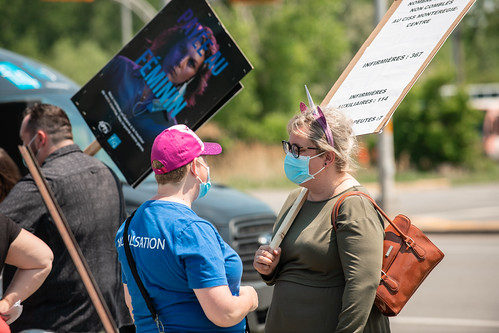
The Minister of Health and Social Services must intervene in negotiations
The FIQ and FIQP members in East, West and Centre Montérégie had a message to send to their MNA, Minister of Health and Social Services, Christian Dubé. He has an important role to play in the current negotiations. He must put pressure on the Treasury Board president and premier to reach a satisfactory collective agreement that includes the necessary salary increases to tackle head on this unprecedented shortage. This agreement will need to be the first solid step in an action plan to resolve the serious workforce shortage in the health network.
“Minister Dubé has been crowned the vaccination hero. He can deliver the goods. Now we are asking him to put just as much energy into resolving the healthcare professional shortage. To change the status of the shortage from red to green, we need to attract, retain, and bring healthcare professionals back to the network. We know from other economic sectors that it takes more than goodwill to tackle the shortage and to attract the best resources to care for the population. It takes robust leverage, including higher salaries than what are currently on the table. It’s crucial and the minister can’t overlook it.”
Nancy Bédard, President of the Fédération interprofessionnelle de la santé du Québec–FIQ
“As it stands, services and care quality offered to the population are compromised and there are service interruptions in several regions. The call-back lists have been exhausted. Our members are overloaded and have run out of patience after years of complacency in the network. They are now throwing in the towel. They are going to agencies that offer better conditions. In the end, it’s the population who suffers. Isn’t the Minister of Health and Social Services worried that higher standards can’t be maintained in the health network? Without decent salaries, how does he expect to convince professionals who stay not to leave the profession when they will be better paid and recognized elsewhere?”
Sonia Mancier, President of the Fédération interprofessionnelle de la santé du Québec–FIQP | Secteur privé
“The healthcare professionals we represent in the Montérégie territory reflect those throughout the province. They are fed up with dealing with the consequences of the government’s inaction to alleviate the shortage. It has been going on for far too long. With the arrival of the pandemic, they pulled together and showed up, but there is no denying the many impacts it has had on them. On one hand, our members are exhausted, overloaded, and demotivated. On the other, patients sometimes can’t access care or receive inhumane care that is low quality and unsafe. Healthcare professionals leave the network every day, worsening the shortage. Time is running out and the government must act now to implement solutions that will, over the short and medium term, allow them to believe better days are coming.”
Mélanie Gignac, president of the Syndicat des professionnelles en soins de Montérégie-Ouest, Brigitte Pétrie, president of the Syndicat des professionnelles en soins de Montérégie-Est and Denis Grondin, president of the Syndicat des professionnelles en soins de Montérégie-Centre
